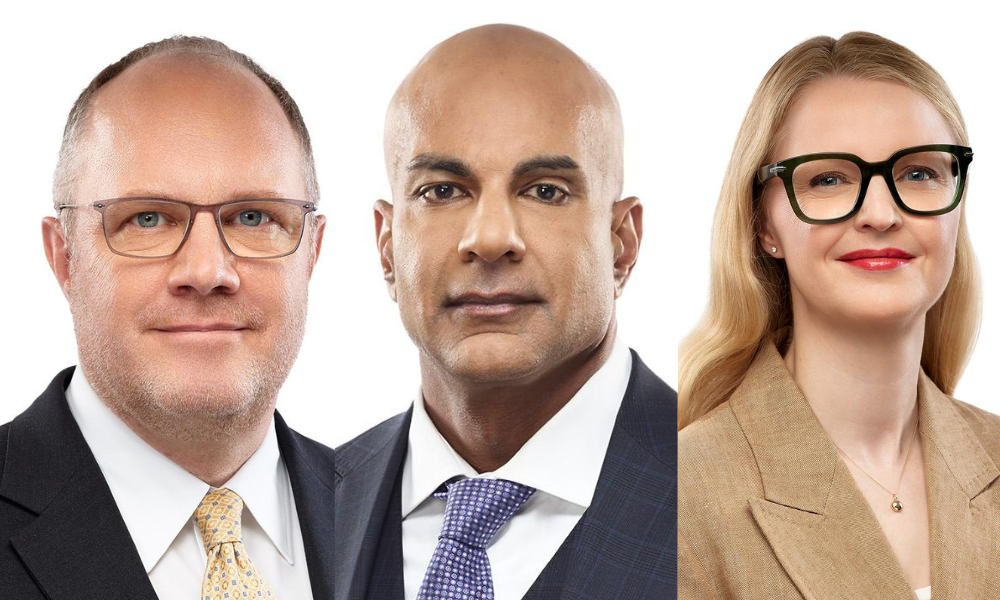
Robert Hayhoe, Nicole D’Aoust, and Raj Juneja talk plans for expanding the group’s scope and ranks

McCarthy Tétrault is expanding its national tax group through the creation of a new charities and non-profits practice group. While the firm has recruited two partners to launch the initiative, the hiring process isn’t over yet.
Robert Hayhoe is leading up the practice. Nicole D’Aoust is the other member of the group. Both were formerly at Miller Thompson and are now working out of McCarthy’s Toronto office.
McCarthy partner and tax group co-head Raj Juneja says expanding the firm's tax practice has been part of his mandate since he was hired six years ago. Adding a charities and non-profit group makes a lot of sense, he says, both when it comes to finding new clients and providing service to its existing ones.
“From our perspective, there are a lot of large foundations out there that require very sophisticated advice,” Juneja says. “A lot of our clients, big multinationals, have created large foundations and are often seeking out advice, or we are left having to refer them to somewhere else, where we’re not sure they’re necessarily getting the absolute best advice out there.”
This isn’t the first time that McCarthy has had a charities group. “It’s something that McCarthy had done a long time ago but never actually specialized in it,” Juneja says. “I don't think we did it very well, and so we decided not to do it.” Today, however, he calls it a “big opportunity” for the firm, especially since the group is "not one which we have competitors [for] at the sister firms.”
However, it's not an opportunity that comes without effort. According to Hayhoe, launching the charities and non-profits practice group will involve dealing with transaction costs, direction and new retainer letters, moving clients, and more. Still, “It will help us, we hope, up our game and do better work for our clients,” he says. “We really do think of it as an opportunity that’s worth a little bit of temporary pain.”
One of the authors of the textbook Charities Taxation, Policy and Practice, Hayhoe didn’t start out in charities and non-profit work. Instead, he began his career handling more conventional corporate tax and tax dispute work.
D’Aoust also moved into the charities and non-profit field after working as a corporate tax lawyer. Hayhoe says that type of background is something they are looking for when it comes to hiring new members of the team.
“We think of this as a tax practice, so we’re very focused on making sure that people have a good tax background, because understanding the charity rules by themselves is useful, but they need to really be understood in their broader context within the tax system,” he says. “We’re interested in finding people who have either charities-specific experience or people who have good tax experience from here or from other good Canadian law firms, and who are interested in taking their general tax knowledge and focusing it on this as a subspecialty.”
Having a clear understanding of and ability to explain complex tax rules will be especially important skills, given the evolving nature of the laws and regulations that govern the charitable sector in Canada. For example, D’Aoust points out amendments to the Income Tax Act that were made a few years ago that deal with qualifying disbursement rules. She explains that they were instituted after Indigenous, BIPOC, and other organizations wanted easier ways to make grants from charities to non-charities, both within Canada and outside its borders.
“We now have guidance… from the CRA in terms of how they plan to interpret those rules on the Income Tax Act,” D’Aoust says. “We’re at the very forefront of charities starting to utilize those rules and trying to make grants easier.
“But at the same time, there’s still a lot of clarity that’s needed from the regulator… [about] how to utilize these rules in the way that they were intended, which is to make granting easier. There’s a lot of complexity in the rules themselves and in the guidance product,” she adds.
The Canadian taxation regime is also an area of interest to US-based charities and companies that are evaluating Canada’s potential as a safer, more stabile home for their charitable funds in light of the current American political climate.
“We’ve been both giving advice to large US organizations with names you’d recognize and also having some discussions with the Department of Finance on whether there are some rule changes that could be done that would make this a little bit easier, and would be in Canada’s national public interest and would increase economic growth in Canada and increase tax revenue indirectly in Canada,” Hayhoe says.
These types of concerns and inquiries are becoming more common throughout the US. D’Aoust notes that the fall meeting of the American Bar Association’s business law section, which is happening in Toronto this year, will involve multiple discussions on those issues.
D’Aoust, who describes herself as being active in both the Canadian Bar Association and the Ontario Bar Association, is a bilingual Franco-Ontarian. She runs a francophone practice, which expands the reach of McCarthy’s new charities and non-profits practice group beyond Anglo-Canada, but Juneja says the group is looking to further increase its scope.
“Robert and Nicole are going to build out the group. Right now, I don’t have an entire sense of how big that’s going to be, but it’s certainly bigger than it is now,” Juneja says. “To be able to service clients nationally – to some extent, we can do that and all the common law provinces now – we’ll need Quebec.”